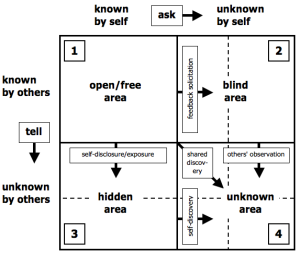What is Johari’s Window?
The Johari window is a tool created in 1955 by two American psychologists, Joseph Luft (1916–2014) and Harrington Ingham (1914–1995). Today the tool is used extensively to help people better understand their relationship with self and others.
Personally I and my fellow colleagues use it to show how self awareness can be developed. What is true for the individual is also true for teams and organisations as a whole.
What is Johari’s Window?
Here’s a quick explanation of how this applies to you as an individual;
Open/Free area
Often labelled “Known”. This quadrant shows those aspects which are readily known about you. They are those areas which you freely let others know about you, and others can freely find out about you. It’s the information about you as a person which is in the public arena.
Hidden area
This is the aspect of your life which you keep hidden. The only way others can know anything which falls inside this quadrant is if you reveal, tell or self disclose. As such, what remains hidden is deliberate. For example – you feel stressed about a deadline but cover it up, you feel inadequate, you spent three years in prison.
Emotional intelligence (EQ) has been found to account for 90% of the difference between great and average leaders/managers. Someone with great emotional intelligence is self aware. Open, authentic, congruent, showing vulnerability and asking for help. Being aware of impact of a current situation makes you stronger, not weaker. As such being more open as a manager/leader is the desired state (subject to sharing because it’s wise to do so).
Blind area
Here you are unaware of what others see or know about you. For example – you get more bossy the more stressed you get, you ignore more junior members of your team when someone more senior enters, you flick your hair when you feel self conscious. The way to increase your self awareness and move into your blind area is if you gain feedback from others as it relates to your personality, behaviours or impact.
Again a huge aspect of high emotional intelligence is being aware of your impact on others, and how others perceive you. Further, a mark of a good manager/leader is deliberately seeking other’s perspectives and soliciting feedback from others. 360 degree reviews are especially helpful in raising awareness within our blind areas. Psychometric tools are often excellent in raising awareness as to our personality traits, behaviours, leadership styles.
Here’s a great video on the hugely positive impact of soliciting feedback from others – even if the feedback is perceived as critical or negative.
Unknown area
The unknown area is exactly that, unknown. Put another way, you don’t know and neither do others. To explore the unknown, a commitment to self development is required. Openness to other’s input. There is an aspect where mutual appreciative enquiry, an approach which takes the input from lots of sources helps us move into the unknown area.
As stated above, tools which are designed to raise our awareness as to how we approach life, work, how we think, behave, act, how we make decisions, take on and process information etc are all useful aspects of psychometric tools.
Does Johari’s Window apply to more than individuals?
An unqualified yes!
Teams?
Operations sees sales as haughty and arrogant. Sales sees operations as boring dullards who seek to stop sales. Each has a perspective on the other – the truth of which is most likely unknown by the other. Sales will be unaware just how arrogant they are – feeling that their behaviours are warranted as without them the company would die. Operations, in their desire to get products/services right, feel entirely justified in being uncompromising in their approach.
Organisations
At a higher level, a whole organisation can be unaware of how the market sees them (unknown area). They keep internal secrets (hidden area) for fear that disclosure would harm their standing. Neither them, nor the market, has any awareness as to what the organisation is capable of (the unknown).
Summary
By committing to a process of development an individual, team and organisation can transform their awareness of self and others. In so doing the way they work and engage will be transformed – catapulting them into an exciting future.
To start this exciting process – just book a call with Mark Bateman here. Mark and his team have unparalleled experience in working with organisations such as yours.

